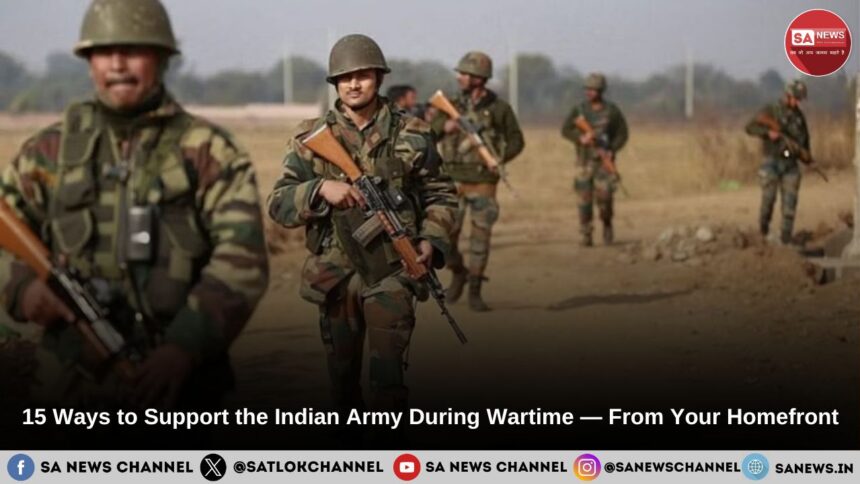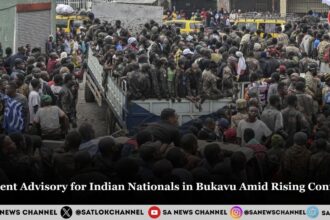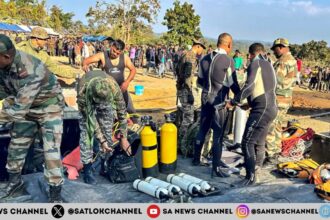While the Indian Army protects our borders, you can protect the nation from within. Patriotism is more than waving a flag — it’s about practicing discipline, awareness, and responsibility when it matters most.
- 1. Don’t Share Photos or Videos of Soldiers or Convoys
- 2. Download Government Emergency Apps
- 3. Verify Before Sharing Anything Online
- 4. Keep Your Location and Geotagging Off
- 5. Limit Permissions for Apps
- 6. Don’t Use Torches or Lights During Sirens or Blackouts
- 7. Enable Emergency Alerts on Your Phone
- 8. Be a Source of Positivity on Social Media
- 9. Plan Travel Carefully and Avoid Conflict Zones
- 10. Store Emergency Cash and Essentials
- 11. Know Your Family’s Emergency Evacuation Plan
- 12. Support Local Relief and Civil Defense Activities
- 13. Don’t Use Suspicious VPNs or Foreign Apps
- 14. Report Suspicious Activity
- 15. Be Spiritually and Mentally Prepared
- Patriotism Is Action, Not Just Emotion
- FAQs on 15 Ways to Support the Indian Army
- 1. How can civilians help the Indian Army during war?
- 2. What apps should I download to stay safe during wartime in India?
- 3. Is it safe to post pictures of army convoys or soldiers?
- 4. What precautions should families take during wartime in India?
- 5. What should I do if I receive fake wartime news on WhatsApp?
Here are 15 powerful and practical ways you can support the Indian Army during wartime:
1. Don’t Share Photos or Videos of Soldiers or Convoys
Never post pictures of troop movements, army vehicles, or soldiers’ locations on social media. Even innocent posts can help enemy surveillance.
Digital mistakes can lead to real-world consequences.
2. Download Government Emergency Apps
Install apps like Sachet or MyGov India to stay updated with verified emergency alerts and safety guidelines.
In war, trusted information saves lives.
3. Verify Before Sharing Anything Online
Avoid forwarding WhatsApp messages or Twitter posts without checking facts. Rely only on official government handles like:
Fake news causes panic — and panic is the enemy’s best friend.
4. Keep Your Location and Geotagging Off
Turn off location access in apps and camera settings. Disable geotags on photos and avoid location-based tagging during emergencies.
Stay invisible to stay safe.
5. Limit Permissions for Apps
Check which apps have access to your camera, microphone, contacts, or files. Revoke permissions not required for the app’s function.
Less digital exposure = stronger personal security.
6. Don’t Use Torches or Lights During Sirens or Blackouts
If an air raid siren goes off or a blackout is declared, switch off all lights and screens. Avoid using torches outside — they can attract enemy attention.
A little light can be a big target.
7. Enable Emergency Alerts on Your Phone
Go to your phone’s Settings > Emergency Alerts > Enable All Notifications. These keep you informed during sudden attacks, natural disasters, or evacuations.
Don’t be the last to know. Be alert.
8. Be a Source of Positivity on Social Media
Share messages that uplift, unify, and support the soldiers and citizens alike. Avoid criticism or panic content that lowers morale.
Your words can either heal or harm — choose wisely.
9. Plan Travel Carefully and Avoid Conflict Zones
Do not travel to border areas, disputed territories, or sensitive locations like PoK-adjacent regions. Double-check your route and bookings before any travel.
Don’t get caught in crossfire — literally or logistically.
10. Store Emergency Cash and Essentials
Digital transactions may fail during war. Keep:
- Cash in hand
- ID cards and documents
- Emergency medicines
- A flashlight and power bank
Be ready for disruptions — hope for peace, prepare for chaos.
11. Know Your Family’s Emergency Evacuation Plan
Every household should prepare:
- A meeting point
- Important contact numbers
- A basic go-bag with essentials
- A home safety drill
Emergency planning is not panic — it’s intelligence.
12. Support Local Relief and Civil Defense Activities
Participate in or volunteer for:
- Blood donation drives
- Local safety drills
- NGO activities for displaced civilians
When civilians rise, the nation becomes stronger.
13. Don’t Use Suspicious VPNs or Foreign Apps
Avoid apps from hostile countries or unreliable developers. Uninstall apps that don’t follow Indian cybersecurity guidelines. Avoid VPNs that reroute data through unknown servers.
Data is the new battleground — don’t hand it over.
14. Report Suspicious Activity
If you notice any unusual people, devices, or conversations near sensitive areas, report them to local authorities or the police helpline. Even one tip can stop a disaster.
When in doubt, speak out.
15. Be Spiritually and Mentally Prepared
In times of war, while soldiers guard our borders with valor, it is the conscious civilian who safeguards the nation from within. Following safety protocols, avoiding misinformation, and maintaining discipline are vital — and these principles align deeply with the spiritual teachings of Sant Rampal Ji Maharaj.
He emphasizes that true service to the nation starts with self-awareness, non-violence, and responsible conduct. As guided in the true spiritual path of devotion, a wise and righteous soul not only prays for peace but actively works to prevent harm to others. Supporting the Indian Army isn’t just about national duty — it’s also about spiritual maturity, compassion, and collective responsibility.
By following both practical wartime guidelines and spiritual values, we can contribute to a stronger, united, and peaceful India. As Saint Rampal Ji Maharaj teaches — true strength lies in spiritual awareness and compassion during tough times.Satsangs by Saint Rampal Ji Maharaj, promote peace, unity, and emotional balance — something every nation needs during crisis.
Mental strength is the unsung armor of every citizen.
Patriotism Is Action, Not Just Emotion
You don’t need to be in a uniform to serve your country. By being informed, calm, and careful, you become a protector of national security in your own way.
Follow these 15 steps not just as a checklist — but as a way of life in times of national tension. Remember, the Indian Army doesn’t need 1.4 billion people on the border. It needs 1.4 billion people who act responsibly from their homes.
Let’s support our jawans — not just with slogans, but with actions.
Jai Hind!
Salute to our Soldiers.
FAQs on 15 Ways to Support the Indian Army
1. How can civilians help the Indian Army during war?
Civilians can help by following digital safety practices, not sharing army movements online, supporting relief efforts, and staying informed through official apps.
2. What apps should I download to stay safe during wartime in India?
Download government-approved apps like Sachet, NDMA Alerts, and MyGov India for verified emergency updates and safety guidelines.
3. Is it safe to post pictures of army convoys or soldiers?
No. Posting pictures or videos of military movements can endanger national security and help enemy surveillance. Avoid sharing such content online.
4. What precautions should families take during wartime in India?
Families should prepare an emergency kit, store cash and essentials, plan evacuation routes, and stay away from sensitive border areas or travel routes.
5. What should I do if I receive fake wartime news on WhatsApp?
Do not forward it. First, verify the news through official government Twitter handles or fact-checking sites like PIB Fact Check, then delete it.









